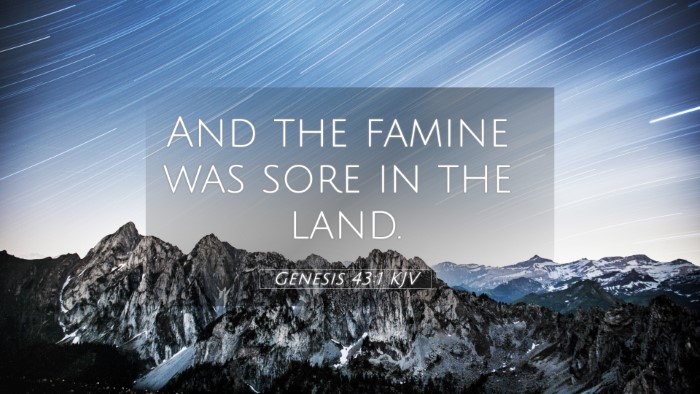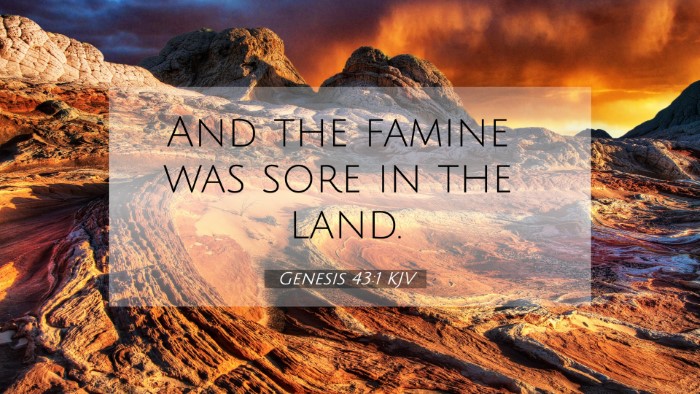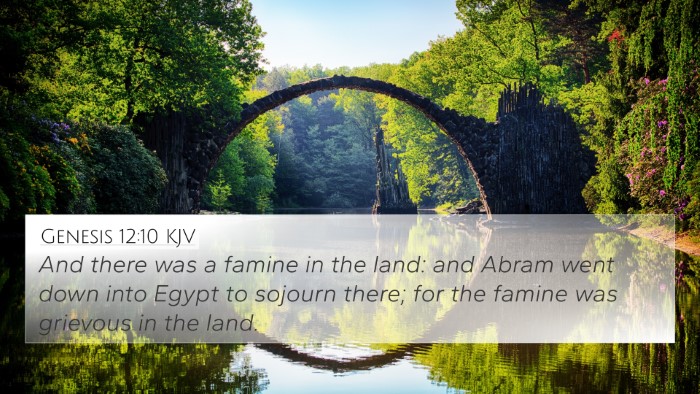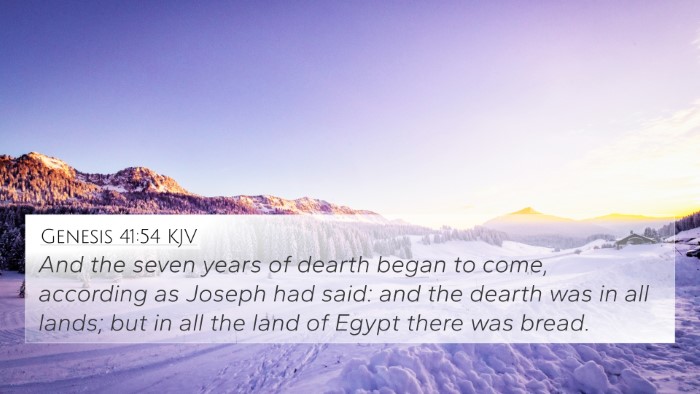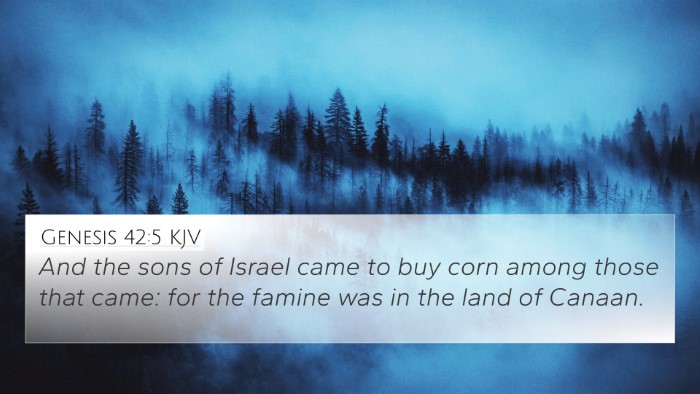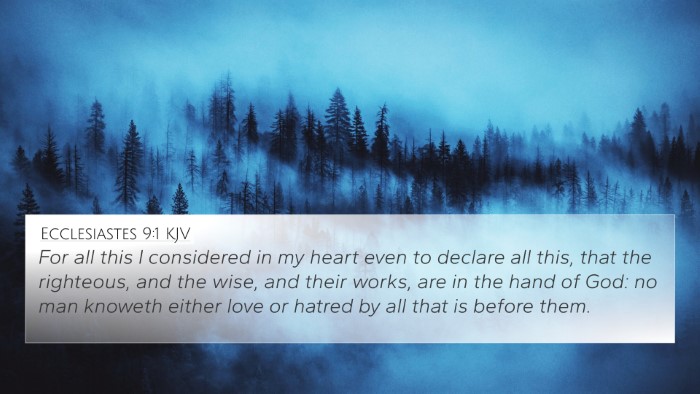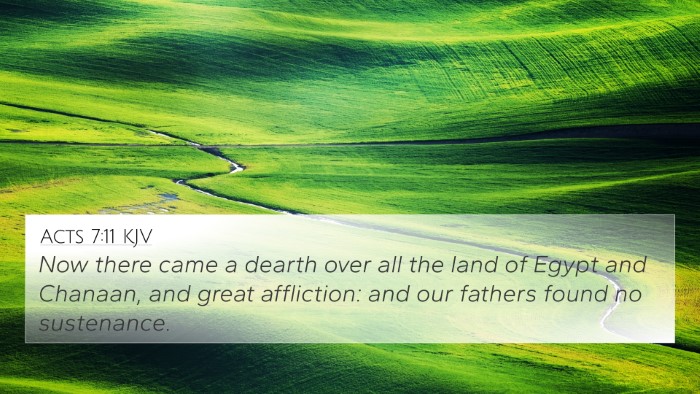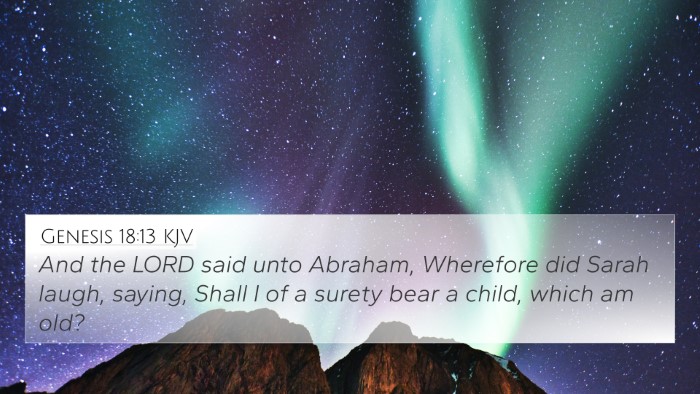Understanding Genesis 43:1
Genesis 43:1 states: “Now the famine was sore in the land.” This verse opens the chapter that undertakes a continuation of the narrative involving Jacob, his sons, and their complicated relationship with their brother Joseph, who they believe is lost to them. This specific verse encapsulates the dire circumstances urging the unfolding of significant events in Israel's history.
Context and Significance
This verse is situated in the broader account of Joseph's story, which emphasizes the themes of famine, survival, and familial relationships. As Matthew Henry reflects, the mention of famine here symbolizes not only a physical scarcity but also represents spiritual hunger that alludes to reliance on God's providential care.
Commentary Insights
- Matthew Henry: Henry notes that the famine is termed 'great,' illustrating a severe situation that necessitates action. This provides context for the journey that Jacob’s sons will later undertake to Egypt, thus highlighting the theme of desperation leading to divine revelation.
- Albert Barnes: Barnes emphasizes the idea that the famine leads to inevitable consequences that are both physical and relational. The actions of Jacob and his sons are guided by necessity, showcasing how trials can often lead to significant divine interactions.
- Adam Clarke: Clarke makes a point of understanding how this famine not only affected the physical sustenance of the people involved but also served as a catalyst for pivotal family reconciliations. He suggests that through suffering, deeper insights into familial ties and responsibilities emerge.
Cross-References
Genesis 43:1 can be related to several other Bible verses that underscore its themes of need, providence, and family dynamics.
- Genesis 12:10: Abraham's experience in Egypt during famine.
- Genesis 41:54: The broader context of famine in Egypt.
- Genesis 42:2: The initial call to action when Jacob sends his sons to Egypt for grain.
- Ruth 1:1: The famine that leads Elimelech and Naomi to Moab.
- Luke 15:14-16: The prodigal son and his encounter with famine, highlighting loss and redemption.
- Matthew 5:6: Blessed are those who hunger and thirst for righteousness, echoing the theme of spiritual need.
- John 6:35: Jesus as the bread of life, fulfilling deeper hungers.
Thematic Connections
Genesis 43:1 establishes a framework within which the reader can explore multiple thematic connections in the Bible. The themes of desperation, dependency on God, and the pursuit of familial relationships are found throughout scripture.
Linking Bible Scriptures
- Famine as a test of faith: Compare with Deuteronomy 8:3 where reliance on God's word is emphasized during trials.
- Acts of provision: Correlate with Philippians 4:19, God’s promise to supply all needs.
- Family reconciliation: Analyze with Matthew 5:23-24 on reconciliation before offering gifts to God.
Tools for Bible Cross-Referencing
For deeper study, utilizing tools for Bible cross-referencing can enhance understanding. A Bible concordance or a cross-reference Bible study will aid in drawing connections between similar scriptures.
Practical Application of Cross-References
When interpreting a verse like Genesis 43:1, knowing how to find cross-references is essential. It allows one to identify connections between the Old and New Testament, like the hardships endured by God's people, providing a comprehensive understanding of the scripture's implications.
Studying Biblical Texts in Context
Genesis 43:1 sparks an inquiry into the context of biblical themes, which are echoed throughout different parts of the Bible. This verse leads to an exploration of how God's providence is highlighted during periods of distress.
Conclusion
In conclusion, Genesis 43:1 serves as a reminder of the multifaceted nature of scripture where physical realities often mirror spiritual truths. The connections made through cross-referencing with other verses enrich our understanding and illustrate God’s faithfulness amid life's trials. Engaging in a comparative Bible verse analysis deepens the reader's comprehension of God's overarching narrative in the Bible.

